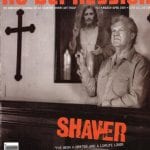Kate Campbell – Hymns and hers
Pilgrims, migrants, wayfaring strangers: recurring figures in the annals of Christianity and America. Their gaze fixed on far-distant shores, they are in a constant state of transition, never quite connecting with the world around them.
A Southern Baptist and student of American history, Kate Campbell knows a little about sojourns. So it’s only natural that Wandering Strange, her fifth album and first gospel record, is rife with wanderers and seekers.
A vigorous heritage of folk, soul, R&B and Southern rock has informed Campbell’s music since her debut album, Songs From The Levee, in 1995. Wandering Strange, released in February on Eminent Records, continues down that path. Fresh and welcoming, the album was recorded in just two days. It features a half-dozen hymns from the 18th, 19th and early 20th centuries, along with several of Campbell’s own compositions and a Gordon Lightfoot tune, “The House You Live In”.
Couching the hymns in her own modern arrangements, Campbell neatly erases the border between past and present, creating a sense of timelessness that is in keeping with the spirit of the Living Gospel. “To me that’s what the Gospel’s about,” she says. “If you can’t make it relevant to your own life, then hey.”
A self-confessed language junkie who sat transfixed by the PBS series The Story Of English, Campbell cherishes the linguistic grandeur of the hymns she first learned to love as a child in church. “Oh, to grace how great a debtor/Daily I’m constrained to be/Let Thy goodness like a fetter/Bind my wandering heart to Thee,” she sings in “Come Thou Fount”, capturing the exaltation and dignity of this 1758 composition that she’s complemented with electric guitar and mandolin.
Campbell’s own compositions include “The Last Song”, a soulful and slightly cheeky recounting of the walk to Gethsemane: “Jesus started humming an old tune, everybody fell right in…Matthew started singing the low part, John grabbed the high harmony.” Somewhat apprehensively (her father is a Baptist preacher), she auditioned the tune for her parents. “This is you, Kate. This is what you really wanted to sing all along,” was their immediate response.
The sweet groove of “The Last Song” is counterbalanced by the equally soulful “10,000 Lures”, a warning about Satan’s wiles and the evil that, for Campbell, is a real force stalking the world. “I think Agatha Christie said, ‘No one is beyond committing murder,'” she muses. “Maybe it’s just my old Southern thing about ghosts and stuff lurking around, but I think there have been times in my life when I just felt an evil around me.”
In Wandering Strange, as in earlier albums, evil’s foulest raiments include racism, which turns its victims into outcasts in their own country. “Bear It Away” elegizes four young girls killed in the 1963 bombing of Birmingham’s Sixteenth Street Baptist Church and recalls the civil rights struggles Campbell witnessed growing up in Sledge, Mississippi. Few Southern white Baptists supported their black counterparts in that fight, but Campbell’s father was one who did: “My father took a very courageous stand against segregation, and it was discussed that if the Freedom Riders were to come to his church, they would be welcome.”
Understanding the past is critical to Campbell, who completed an M.A. in Southern History at Auburn University in Alabama and taught American History and Western Civilization at Nashville’s Belmont University and Middle Tennessee State University before launching her musical career in the early ’90s. The heritage of racism is “shameful,” she says, but “for me, it’s a way to try to understand where I come from. How am I going to reconcile that in my own life and deal with it? It was when I started writing about where I came from that my music really came together.”
Campbell’s abiding fascination with the South has prompted comparisons to the writing of Eudora Welty and Flannery O’Connor. “It’s very flattering, but I wouldn’t even put me…I mean these are great women writers,” she says. “I think they do that just to give people an idea of the some of the language I use and the sense of place that’s there.”
Wandering Strange takes its title from a track on Campbell’s third record, Visions Of Plenty (“And you’re left wandering strange/This side of heaven”). When it came time for recording, she headed for the familiar: Muscle Shoals’ legendary Fame Studios, where Allman Brothers and Aretha Franklin posters still paper the walls, and where Campbell once worked as a songwriter and demo singer.
The resulting album was exactly what she’d hoped for. “It seems joyful,” she concludes, “and it’s the way I wanted to express the music and the hymns I had grown up with, and some of the things that are important to me.”




